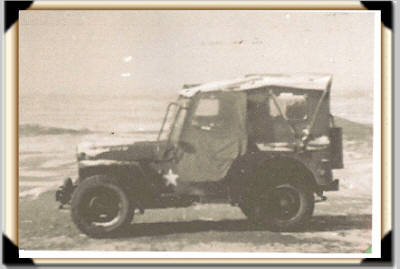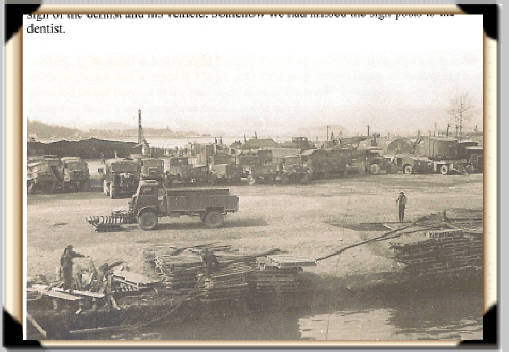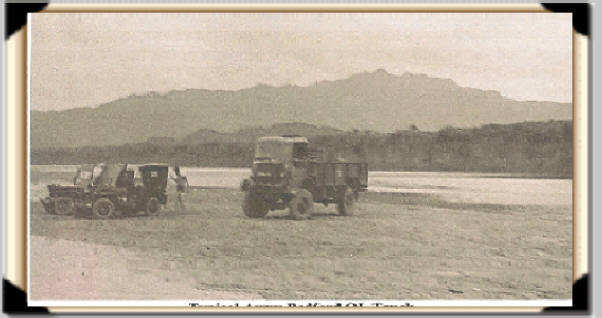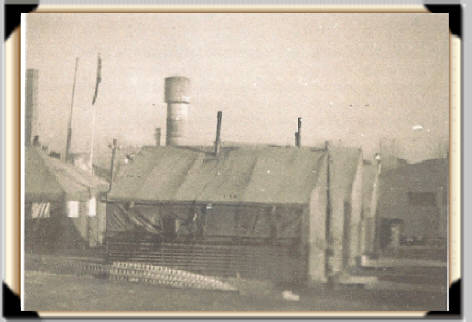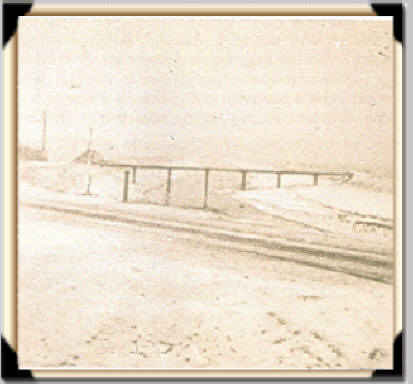A Bad Tooth Meets an Army Dentist
The tooth ache had started the night before and at first seemed innocuous, but as the night wore on it got worse until, when the morning came, I was driven out of my bed in desperation looking for a pain killer. An old fashioned aspirin afforded some temporary relief. That was enough for me to get into Army issued Winter Warfare kit and cut across the frozen ground to the HQ tent. There I sought leave to find a dentist.
Fortunately the Chief Clerk knew more or less where the local Army dentist was operating that day and organized some transport for me. However, his directions to the driver were necessarily vague. Apparently the dentist worked from the back of a specially adapted truck and moved about in a somewhat unplanned way on his daily rounds amongst the units of the British Line of Communication. The Chief Clerk's directions were simply to drive west from our camp in Yong Dong Po along the main road to Inchon. The dentist was �somewhere� on the road visiting a minor unit and I had only to follow the road to find him.
The ride in the jeep was a rough one. The road to the port of Inchon had long since deteriorated under heavy military traffic and its surface was rutted, pot holed and frozen solid into a hard uneven, broken and unyielding surface. The jeep's suspension of old fashioned cart leaf springs were rugged enough to survive the pounding, but did little to alleviate the roughness of the ride. Protection from the cold winds consisted of just a canvas hood, the flat windscreen, damaged side panels and a totally inadequate heater. However, at least the uncomfortable bouncing progress and the piercing cold did provide a distraction from toothache. It was when my driver stopped the jeep that the agony of that festering tooth reminded me of the urgency of my case.
The cold in the tent was indescribable. It cut through to the core of my body despite my cowering inside the heavy sleeping bag. Harder to bear was that the cold targeted one tooth in my lower jaw with an intensity that over rode every other sensation for minutes on end.
The Jeep in the Depths of the Korean Winter
Port Area - Inchon
National Service was still in force in 1954 and required most able bodied young men in the UK to serve two years in one of the services. A large proportion of the Army's strength in those days was made up of National Servicemen. Most were drafted in to do their service when they finished school at the age of about 18. However certain categories of people were granted delays to complete advanced education courses and included people like doctors, engineers and, of course, dentists. When drafted these professionals were granted a commission and brought in to practice almost directly upon graduation. They were given very cursory military training and then let loose on the tame population of servicemen. In this way these budding professionals had a captive clientele on which to practice, make mistakes and gain experience without too much risk of complaint from their clients.
My dentist was one such professional. He had completed his training as a dentist somewhere in England and was now in the Army to develop his skills and was very eager to do so. But the Army population, being made up of a youthful and generally very fit soldiery provided a relatively limited number of aching teeth or other associated problems. So I guess it should not have been such a surprise to be welcomed by him with such alacrity.
He gave his driver (who also doubled as dental nurse or assistant) instructions to park the truck and set it up for business. My recollection is that they parked it by a large reservoir of water near by which the Royal Military Police (RMP or the �Red Caps�) had set up their camp. I was first in the queue for attention, being the only one there. The RMP's either had excellent teeth and no dental problems or the dentist's reputation had preceded him and they were all ducking for cover.
Anyhow, I did not have much choice as he was the only dentist around and I had a dire need. So I climbed the ladder that had been extended from the back of the truck and entered his sanctum.
The back of the truck was a box like structure about 20 feet long, 8 feet wide and seven feet high. Inside there was a bench on one side with cabinets filled with the paraphernalia and tools of dentistry. At the back was a small work bench. In front of this bench was fixed the traditional style of dentist chair.
The dentist's chair was adjustable for height and rake. On the left side of the chair was the usual pedestal with spittoon set on top and pipes for �fresh � water (actually drawn from a tank under the truck) and for the removal of waste (that pipe had its exit under the truck and deposited the detritus of dentistry straight onto the ground underneath�.. hygiene and care for the environment were not such important considerations in those days and in a theatre of war. Above the chair was a light to illuminate the patient. To the right was a contraption that could only be the dreaded dentists drill.
The drill was very old fashioned. It was pedal operated. The dentist had to make the drill work by alternatively pressing and releasing a foot pedal that turned a small flywheel. This in turn rotated a pulley that drove a smaller pulley on the drill head via a long endless thin cable and two arms that enabled the dentist to manipulate the drill. The effectiveness of this contraption depended largely on the friction between the driver and driven pulleys and the cable. Any slippage would cause the drill bit either to judder or stop altogether.
For a dentist trained on modern dental equipment, driven by electric motors and reliable drive mechanisms, the contraption provided by the Army in the mobile dental unit was a challenge indeed! And so it proved in my case.
With more than some trepidation I sat in the chair and submitted myself to the ministrations of this young British Army dentist. I count myself fortunate in that he gave me a sedative and a pain killer (Novacain?) before he turned his attentions and his drill on my recalcitrant tooth.
Things started off well enough, but it was not long before it was obvious that he was having problems. Despite the cold he started to perspire and I could see the beads of sweat on his brow as he ministered to my needs. The tooth was at the back of my mouth and hard to get at. He had difficulty at first in positioning the drill, and when he got it going its speed varied; he was obviously having problems coordinating his footwork on the pedal drive with what his hands were doing.
Eventually the inevitable happened. The drill bit stuck in the tooth and he could neither turn it nor extract it. The manual drive simply did not have enough friction to drive the drill. In the end he had to break the tooth to get the drill bit out. He capped this performance with the application of various pincer tooth extractors to remove the remnants of my misbehaving dental appendage.
By this time I too had forgotten how cold it was and began to sweat profusely. Despite the Novocain I was in some pain and a lot more apprehensive about how my time in this torture chamber would end. I could not see what was going on of course and the dentist was totally uncommunicative. All I could hear were his heavy breathing, the cracking of the tooth and scratching noises as the pincers tried to get a grip on the remaining pieces of tooth, followed by a very sharp but muted stab of pain as each fragment was pulled out.
I must say that the relief when all was over was welcome indeed. I have no clear memory of the trip back to Yong Dong Po, except a recollection of the Chief Clerk's face when he saw me get out of the jeep. Although he said nothing I could see a clear resolve in his eyes that he would never go to an Army dentist if he could help it! He might have resolved also to never send anyone else to the same fate.
I must have looked a bit of a mess then, more so next day when my jaw and face had swollen to unusual proportions. But then I must be thankful because there is no doubt that my dentist friend had cured the toothache. I, like the Chief Clerk, swore thereafter never to submit to the ministrations of such a professional again!
By a stroke of fortune we eventually spotted a rather dirty Bedford QL 3 ton truck turning off the road ahead of us. It was obviously a British Army vehicle with the rectangular silhouette and upright boxy stance typical of a World War 2 veteran. It had entered a side street along which there were signs to a Royal Military Police outpost. It turned out that the truck was the mobile dentistry I was so desperately seeking. With relief at last in sight I urged the driver on. We managed to get in front of the old truck and stopped it. I leapt out of the jeep in high hopes of getting my tooth attended to and hurried to the passenger side of the truck. I was greeted by a rather dusty red faced youth on whose tunic I could see the three pips of a Captain and the badge of the Royal Army Dental Corps. On hearing my explanations and the reasons for my haste he made sympathetic noises and said he would be happy to treat me. In fact I suspected that he had not had a very interesting day to that point and was glad to see a client at last.
